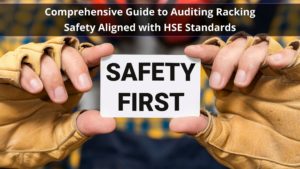
“On the first day of Christmas, my employer gave to me…” Give your staff the gift of safety this Christmas. It’s cheap, you don’t have to wrap it, and they will definitely appreciate it.
We don’t want to sound like a Scrooge, but Christmas can be a dangerous time of year for the British workplace. The pace of work gets faster and attitudes get laxer, as sales increase and staff start seeing their Christmas time off fast approaching. Employees might stop thinking about rack inspection training and start thinking about mince pies, warm sherry, and the Doctor Who Christmas special.
So, just to make sure that everyone is driving home for Christmas in one piece, here are twelve workplace dangers to watch out for during this wonderful time of the year.
1. Cold Workplaces
A cold workplace isn’t just annoying; it can be dangerous. It is because of this that HSE suggests how cold they think a workplace should be. For most workplaces, HSE recommends a minimum temperature of 16 degrees Celsius. However, if the work involves “rigorous physical effort”, then HSE suggests a minimum temperature of 13 degrees Celsius. HSE also points out that these temperatures are not a legal requirement. It is ultimately the responsibility of the employer to decide how cold is too cold.
2. Icy and Wet Floors
Even if you’ve got the temperature of your workplace right, the cold can still wreak havoc on your floors. Wet floors in sub-zero conditions can become icy floors and accidents are often not far behind. HSE has plenty of advice on how to avoid slips, trips, and falls on slippery floors. However, here’s a brief summary of what you can do.
- Both icy floors and wet floors should be dealt with immediately after they are discovered.
- Preventative measures should be taken to stop floors from being slippery in the first place.
- Workers can also take precautions themselves to avoid slipping (i.e. wearing the right footwear and not running).
3. Flus, Colds, and the Sniffles
Yet another danger of the cold workplace is the illness it can spread. During the colder months of the year, it’s likely that most of your employees will have a runny nose and a mild cough. This is the sniffles and, thankfully, your employees can probably soldier on through it.
However, when you have a whole group of people spending all day together, swapping germs with each other, and running their immune systems into the ground with Christmas overtime in a cold workplace, the sniffles can develop into something more sinister. Fortunately, the NHS has plenty of advice on how to stop the flu from spreading, as well as guidelines on stopping the spread of germs in general.
4. Overloaded Racking And No Rack Inspection Training
For most businesses, Christmas is the busiest time of the year. However, while all of that extra business is hardly a bad thing, it can bring with it some unintended downsides.
More sales mean more stock and more stock means a higher risk of overloaded racking systems. It is during December that rack inspection training from a SEMA approved rack inspector is most important.
But it’s not enough to rely on just an annual inspection from a SEMA approved racking inspector. HSE also recommends regular racking inspections from someone with knowledge of pallet racking systems. During the Christmas quarter, when racking is taken to its limit with tonnes of new stock, pallet racking inspections from staff who have received pallet racking inspection training becomes vital.
5. MSDs and Injuries from Bad Lifting
Musculoskeletal disorders are the result of bad lifting and one of the most common workplace ailments. During the Christmas period, with new stock flooding into a business, more employees are lifting more objects more frequently than at any other time of the year. As a result, the risk of MSDs or a more instant injury — such as a pulled muscle — increases exponentially. Fortunately, there is plenty of advice out there on how to lift properly and safely.
6. A Busy Shop Floor
When there is a potential danger on your shop floor — whether that’s because of a slippery surface, because something has fallen, or because something could be about to fall — sorting it out as quickly as possible is imperative. However, when your shop is busy, these dangers are much more frequent as customers themselves may bump into things and create problems. More customers mean more potential accidents, so make sure everything is ship-shape.
7. Opportunistic Thieves and Shoplifters
It’s as sad as it is true that some people take advantage of the confusion of the Christmas crowds in order to steal things. Shoplifting has a nasty habit of increasing during the Christmas period, so be wary.
8. Agitated Customers
Whether it’s because of lengthy queues or the aforementioned shoplifting, tensions can run high during Christmas shopping. Customers can get angry and, when they do, accidents can happen. Remember that it is the season to be jolly and try to keep everyone calm and safe — staff and customers alike.
9. Distracted Staff
Christmas is coming up, so being the kind boss that you are, you give your staff a little bit of leeway here and there. There’s Christmas music playing throughout the building, a few guys are wearing Santa hats, and everyone relaxes a little bit.
There is, of course, nothing wrong with any of this. Far be it from anyone to deny hardworking employees a little Christmas joy. Still, it’s worth remembering that, whatever concessions you decide to give your employees, be sure that safety still remains a top priority.
10. Hungover Staff
Christmas can be a pretty boozy time of year, and it’s important to take precautions. All that mulled wine may have seemed like a good idea at Jerry’s pre-Christmas get-together, but now it’s 7:30am and you wish the bus to work would just burst into a ball of flames.
Being hungover at work might seem hilarious if you’re young or work at a desk, but any kind of physical labour becomes difficult at best and fatally dangerous at worse. Don’t let it slip through the net. If an employee arrives at work noticeably hungover, send them home. If they made the extremely dangerous and potentially illegal decision to drive to work, be certain that they don’t drive back.
11. Christmas Decorations
A Christmas without decorations is hardly Christmas at all. Still, while all those boughs of holly may look lovely, it’s important to know that they’re safe. Risk assessments are a necessity at any workplace and during Christmas, when your workplace has the potential to be filled with fairy lights, dancing Santas, and a smorgasbord of other decorations, it’s time for another quick risk assessment. It would be the harshest of ironies if your decorations, designed to bring people cheer, ended up injuring someone because they were placed in an inconvenient or dangerous location. Be safe and give each decoration a thorough once over; a decent risk assessment goes a long, long way.
12. Forgetting Your Annual SEMA Approved Rack Inspection!
It’s getting towards the end of the year and you’re certain you’ve forgotten something. Still, it’s Christmas now the busiest quarter for your business, so whatever it is will have to wait until next year, right?
Wrong. HSE recommends a SEMA approved rack inspection from a SEMA approved rack inspector at least once a year for good reason. Ideally, your annual rack inspection should be performed before Christmas, when any issues can be dealt with before your racking is loaded with a huge amount of Christmas stock. If you put your rack inspection off longer than a year, you run against HSE’s advice. With the new CDM regulations, this makes you solely responsible for any accidents that might occur as a result of putting off your annual SEMA approved rack inspectors.
Christmas is a stressful time of year and there’s almost no avoiding that. However, with our advice, at least your Christmas will be a safe one.
Give your staff, your customers, and yourself the gift of safety this year with a racking inspection by a SEMA approved inspector from Storage Equipment Experts.





